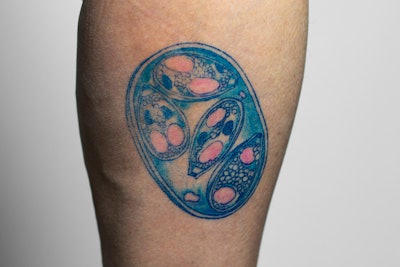
If you want to know what the newly discovered poultry parasite, Eimeria hargisi, looks like, just look at the tattoo on Billy Hargis’ leg.
Hargis, a distinguished professor of poultry science and director of the John Kirkpatrick Skeeles Poultry Health Laboratory, part of the Arkansas Agricultural Experiment Station, the research arm of the University of Arkansas System Division of Agriculture, was honored that the microbe was named after him. So, he celebrated by getting an image of the parasite permanently tattooed onto his leg.
“I wanted to commemorate it a little differently,” he said.
Discovering a parasite
Researchers at the Ontario Veterinary College at the University of Guelph discovered the new species of Eimeria during a study that took place at a commercial partridge farm.
Eimeria is a genus of species that cause coccidiosis in a variety of species, including poultry, cattle, sheep, rabbits, bats, fish and seals. In commercial poultry, coccidiosis is one of the most common causes of intestinal wall damage in poultry. As the parasite goes through its normal lifecycle, it infects and infiltrates cells in the gastrointestinal tract of the host. The parasite causes a weakened immune system, looser droppings, poor nutrient absorption, reduced performance and sometimes death.
Surviving birds typically underperform and are more susceptible to necrotic enteritis caused by Clostridium perfringens and Salmonella.
“The parasite is named to honor Dr. Billy Hargis for his exemplary research record in support of poultry gut health and his past and ongoing advancement of coccidiosis research through the training and mentorship of future scientists,” the research team states in the study, published in the December 2023 edition of the Journal of Parasitology.
A permanent parasitic reminder
Some people might be weirded out about having a parasite named after them, but the science nerd in me celebrates this. (I can’t wait to talk about my favorite parasite at the next party I attend). I’m even more excited that Hargis is celebrating the naming with a permanent reminder of his namesake.
After all, if more people celebrated science, I think we’d get more people excited about science. (Which benefits science!)


















